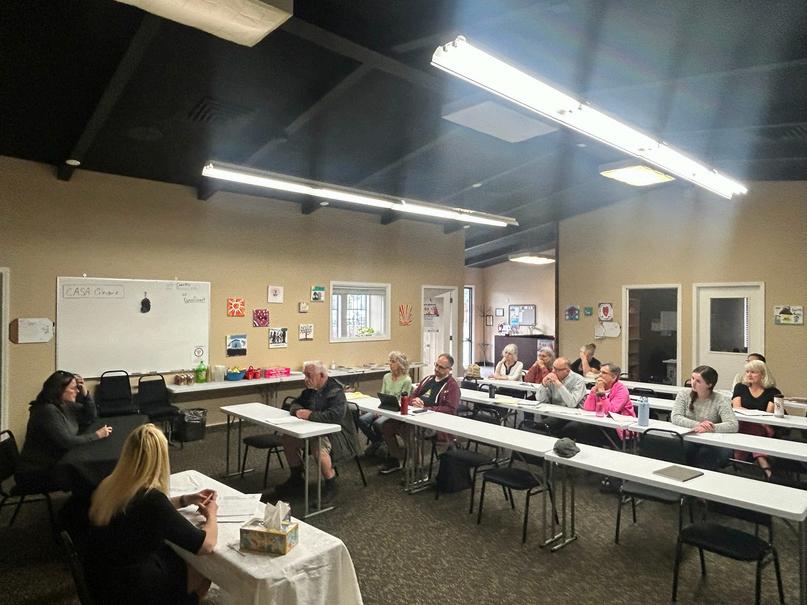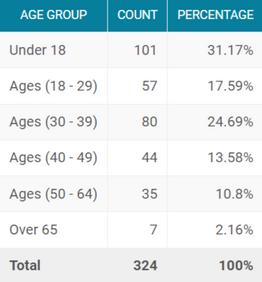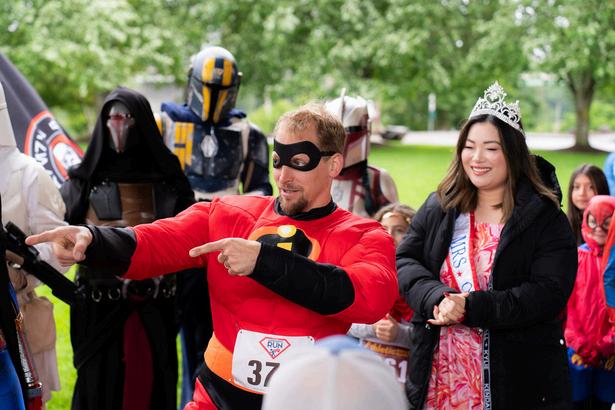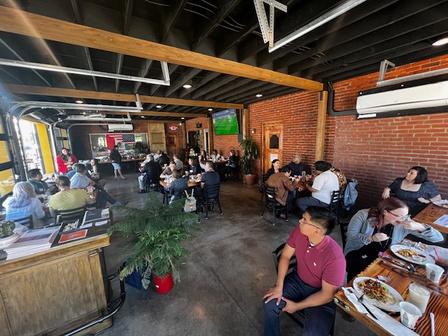





A Message from Executive Director Vanessa Nordyke, JD
Introducing the inaugural edition of CASA Insider, an electronic magazine dedicated to all things CASA! Inside, you’ll find foster care facts and data, upcoming events, and a deep dive into our mission to advocate for the health, safety, and education of foster youth. We hope you enjoy it--and share it--with your friends and family.
People often ask, “How are things going at CASA?” Well, this electronic magazine is intended to answer that very question! CASA Insider takes you behind the scenes at Marion County’s only nonprofit required by law and appointed by judges to represent children in foster care cases.
Whether you ’ re a longtime supporter or just started following us on social media, CASA Insider will deepen your understanding of foster care.
For instance, did your know Marion County has the fourth largest foster child population in Oregon? Did you know CASA teens graduate at a higher rate than the statewide average for all teens? We want you to know what it’s like running a small but mighty team of seven employees to serve hundreds of abused and neglected babies, children, and teens across a rapidly growing and diversifying county. Most of all, we hope to inspire you. Your support propels our pursuit of justice for our county’s most vulnerable children.
We are CASA; the voice for the voiceless.


We know the deck is stacked against children in foster care. By age 21, just 49% of all Oregon foster youth have a high school diploma or GED. (Source: Annie E. Casey Foundation 2023 Oregon Profile Transition-Age Youth in Foster Care).
This year, seven out of the eight foster teens assigned to a Marion County Court Appointed Special Advocate graduated on time. Rest assured that we are not giving up on our eighth teen. CASA’s graduation rate of 87.5% beats the statewide graduation rate of 81% (based on 2023 statewide data).
CASA is dedicated to helping foster teens graduate on time. We check our teens' grades and attendance records. We ask our teens about their homework. We help them enroll in summer school, get school supplies, and basically do whatever we can to help teens succeed.

The top four counties based on foster youth population are Multnomah (989 kids); Lane (648 kids), Jackson (370 kids), and Marion (361 kids).
Marion County
CASA of Marion County's annual "We are for the Children" Luncheon returns on Thursday, December 7! Join us at noon to 1 pm at the Reed Ballroom in downtown Salem Interested in serving on our planning committee? Serving as a table captain? Seating is limited, so you will want to reserve your seats in advance Email casaluncheon@casamarionor.org to join us! Fact: CASA of Marion County had the fourth
Last year, CASA programs saved Oregon taxpayers $21 million dollars CASA saves money by reducing time spent in the foster care system, achieving safety and permanency much sooner than cases without a CASA volunteer Children often do better in school when a CASA's on the case
You are making a difference

In 2018, the Family First Prevention Services Act modernized the federal child welfare system, with greater emphasis on avoiding placing children in foster care. Oregon DHS is responsible for implementing Family First. Family First funds allow DHS to “increase access to services that prevent children from entering or reentering foster care. This includes parent training, mental health care, family therapy, and substance abuse and treatment programs. ”
DHS acknowledges that “Poverty is often mistaken for neglect, resulting in increased rates of child abuse reports and unnecessary foster care, group and institutional placements.” DHS further acknowledges that “Due to racial and discriminatory biases, practices and critical decisions result in racial, ethnic and tribal disproportionality in children of color.”
As a result, Oregon DHS steadily reduced foster care placements year by year.
CASA of Marion County's annual "We are for the Children" Luncheon returns on Thursday, December 7! Join us at noon to 1 pm at the Reed Ballroom in downtown Salem Interested in serving on our planning committee? Serving as a table captain? Seating is limited, so you will want to reserve your seats in advance Email casaluncheon@casamarionor.org to join us!
By 2022, the number of Oregon children in foster care fell to 5,051, the lowest in 16 years.
Our numbers declined, too, but CASA still has plenty to do. We had 361 children in foster care in 2023. So long as abuse, neglect, and addiction remain, foster care will exist.
Last year, CASA programs saved Oregon taxpayers $21 million dollars CASA saves money by reducing time spent in the foster care system, achieving safety and permanency much sooner than cases without a CASA volunteer Children often do better in school when a CASA's on the case
You are making a difference

Between 2021 and 2022, the median number of months in foster care jumped from 17.1 to 25.1 in Marion County. The statewide median increased from 21.3 to 23.4. Note: DHS has not yet published data for 2023.
The longer kids stay in care, the more uncertainty, trauma, and disruption they face with adverse impacts on graduation rates, physical and cognitive development, emotional well-being, and so on. The longer children linger in foster care without a permanent or safe home, the more medical, behavioral, and specialized educational services they will need. In other words, the statewide increased duration of foster care makes resource navigation more important than ever.
CASA of Marion County's annual "We are for the Children" Luncheon returns on Thursday, December 7! Join us at noon to 1 pm at the Reed Ballroom in downtown Salem Interested in serving on our planning committee? Serving as a table captain? Seating is limited, so you will want to reserve your seats in advance Email casaluncheon@casamarionor.org to join us!
Last year, CASA programs saved Oregon taxpayers $21 million dollars CASA saves money by reducing time spent in the foster care system, achieving safety and permanency much sooner than cases without a CASA volunteer Children often do better in school when a CASA's on the case
You are making a difference
In 2023, our CASAs averaged 27 months per case (from assignment to case closure), above the countywide average of 25.1 months. This reflects the fact that we prioritize the most dangerous, and difficult cases, to ensure child safety. Judges contact CASA staff to prioritize case coverage.
In 2023, only 25% of cases handled by CASA of Marion County ended in reunification. This means that in the vast majority of our cases, children cannot safely return home.
The data indicates that CASA is handling a shrinking, but more challenging caseload. The risk of volunteer burnout and secondary trauma will increase. Connection to behavioral, medical, and educational supports will help our kids weather the turbulence of two-plus years in foster care.



DHS reports the use of psychotropic medications by foster youth. ORS 418.517(1)(b) defines “psychotropic medication” as “medication the prescribed intent of which is to affect or alter thought processes, mood or behavior, including but not limited to antipsychotic, antidepressant and anxiolytic medication and behavior medications ”
In April-July 2023, 70 out of 307 MC youth received pyschotropic medication. This is substantially higher than the statewide average.
Marion County = 70 out of 307 youth on one or more psychotropic drugs = 22.80%
Statewide = 681 out of 4,857 youth on one or more psychotropic drugs = 13.96%
In other words, over 1 in 5 Marion County foster youth receive medication to regulate thought, mood, or behavior. As advocates, we must ensure that medication is being taken as prescribed. Does the RP maintain an adequate supply? Does child self-administer? And so on.


CASA amplifies its signal through press coverage on multiple platforms, reaching multiple audiences of potential volunteers and supporters. Recent coverage includes KMUZ, KBZY, Keizer Times, Capital Community Media, Statesman Journal, Salem Reporter, and the Oregon State Bar Bulletin.
In its Salem Buzz series, Capital Community Media (CC Media) created a 4minute video about this year ’ s Superhero Run! The video tagline reads: “Did you know that superheroes are real? In this Salem Buzz episode, we attend the Superhero Run put together by CASA (Court Appointed Special Advocates) of Marion County and speak with CASA Executive Director Vanessa Nordyke. Learn more about this event and see all the heroes that we caught on camera!” CC Media’s YouTube video highlighted our work and showcased runners of all ages cross the starting line!


CASA Board of Directors and staff participated in an enlightening Myers Briggs workshop in May 2024. We had an outstanding discussion facilitated by consultant Lisa Rivet regarding our personalities, thought processes, decision-making, and more. This workshop strengthened relationships and communication between staff and board members alike.







In April 2024, we welcomed Keizer Chamber of Commerce Greeters back to CASA.
We shared a CASA success story, our upcoming events, and volunteer opportunities.
We hope to continue strengthening relationships with Keizer and other Marion County residents. We are scheduled to host Salem Chamber of Commerce Greeters on November 15, 2024.





In 2024, CASA launched a Courtroom Advocacy Series. These interactive trainings were designed and presented by Executive Director Vanessa Nordyke, JD. Vanessa drew upon 15 years of legal experience as an Oregon Department of Justice Assistant Attorney General in preparing and conducting a series tailored to CASA’s specific needs. This series educates CASA volunteers about legal ethics, professionalism, public speaking, and examination of witnesses. Hands-on coursework enables CASA volunteers to sharpen their skills advocating alongside seasoned trial lawyers. CASA volunteers practice questioning forgetful, hostile, and emotionally fragile witnesses. Kudos to our amazing CASA volunteers Aaron, Lin, and Sue for Oscar-worthy winning performances as our melodramatic witnesses, and to CASA Volunteer Coordinator Dennis for coordinating and photographing this event.


The best press is the press you don’t pay for--and that includes social media!
We received a lot of Facebook shout-outs about our Superhero Run from folks like MCSO Sheriff Nick Hunter, CASA volunteer Nathan, and board members Justin, Elizabeth and Jenny! Please follow, like, comment and share CASA’s posts! It costs nothing, and helps us organically grow our audience. Thank you to everyone who helped hype the Run!














23cities represented!









$15,188INNETREVENUE!




Park & Rec Permit 1236






More than double registrations: Registrations increased from 149 to 324.
More interest from adults, especially 18-29 year-olds: Last year, kids made up nearly half of registrants (47.7%) (ie, under the age of 18). This year, kids made up 31.2%. This year had higher turnouts in every age range, particularly 18-29 year-olds.
More interest in the 5k: While the one-mile fun run is still our most popular event, the 5k made up 42% of registrations this year. In 2023, 33.5% were 5k registrants. More 5k registrants = more revenue!
More cash sponsors: We increased cash sponsors from $7,000 to $12,500.
More revenue: Net revenue increased from over $9,000 to over $15,000. 2023






We plan to invite even more first responders. The firefighters and police officers all enjoyed themselves, and a superhero-themed event is very “ on brand” for first responders! We will continue to raise awareness of our run within the running community across Oregon. We also plan to beef up our opening ceremony, recruit even more volunteers, and basically have MORE fun! Mark your calendars for the Superhero Run’s return on June 22, 2025!

On April 30th, CASA of Marion County hosted its first of three volunteer appreciation events for 2024. We were pleased to partner with a locallyowned business, Chubby Bao, to offer delicious sandwiches, salad and soft drinks to our volunteers. Volunteers loved the opportunity to chat with staff and board members in a relaxed atmosphere. Sponsorship opportunities are available to pay for refreshments and staffing costs for our volunteer appreciation events. Contact ED Vanessa Nordyke to sponsor.










Please join us in congratulating our staff for their ongoing commitment to foster children (names listed from top to bottom):
First Anniversary
Jacquie, Advocate Coordinator
Vanessa, Executive Director
Second Anniversary
Dennis, Volunteer & Outreach Coordinator
Naomi, Program Manager
Fourth Anniversary
Carla, Administrative Services Manager

Bilingual Advocate Coordinator Ana started in March and hit the ground running! Ana translates documents and appears on CASA’s behalf at several events organized by local Latino organizations, including (1) Latino Business Alliance networking meetings in Woodburn and Salem; (2) Mexico en el Corazon event at Salem Rotary Amphitheater; (3) Community partners luncheon with Oregon Community Foundation in Woodburn; (4) Conexiones Conference and more!



From upper lefthand corner: Ana and Vanessa take a selfie in Woodburn; former state representative Teresa Alonso Leon gives remarks at a luncheon in Woodburn; community partners from Woodburn nonprofits, city staff, OCF staff, and OCF Board Chair Lane Shetterly listen in.


Mo Avishan is an Iranian native and Keizer Planning Commissioner. He has called Oregon home since 1997 and moved to Keizer in 2019. He has an engineering degree and the equivalent of an MBA. He worked in the high-tech industry, mainly Intel for over 25 years, and then pursued consulting and other entrepreneurial activities until retirement in 2020. He held positions as project manager, planning manager, and automation manager, but his passion and specialty were in strategic planning and process improvement. Currently in his retirement he writes, paints, cooks, gardens, and volunteers in various organizations. Please extend a warm welcome to Mo as our newest member of the CASA Board of Directors!


Photos from the Cinco de Mayo events attended by Ana and Dennis.
Thank you for representing CASA!





Raise money for CASA of Marion County by filling Bottle Drop’s Blue Bags with empty beverage containers with an Oregon refund value. Drop off filled bags at any BottleDrop location. CASA gets the refund.
A great activity for kids, especially when school’s out!
Pick up your bags from the CASA office. Plastic, aluminum, and glass can all go in the same bag. No need to sort! Bring full bags back to CASA’s office or drop them directly at a BottleDrop location. Scan the bag tag to open the secure Drop Door. Up to 15 Blue Bags can be dropped per nonprofit each day without an appointment. With advance notice, you can schedule an appointment to drop off up to 50 bags at a BottleDrop Redemption Center.

The Oregon CASA Network includes all 20 CASA programs statewide, which provide CASA representation of children in all 36 counties. OCN works collaboratively to lobby for state and federal funding, share training resources on best practices in child advocacy, create performance metrics, and more.
On May 6-7, executive directors from CASA programs gathered in Bend for the annual meeting.

OCN is adding a full-time Legal Director based on the statewide doubling in requests for legal advice from local programs on a variety of programmatic and HR. ED Nordyke co-presented a mock witness examination, to show CASA EDs how to prepare CASAs testimony and to play a more active role in court proceedings. EDs shared highlights from their own programs, like fundraising tips, employee retention efforts, and more. OCN also discussed our efforts to increase state funding. Currently, state funding provides approximately 20% of CASA of Marion County‘s annual operating expenses. Until and unless the state makes good on its statutory commitment to fund CASA, CASA of Marion County will continue to privately fundraise to cover payroll and other essentials.



In May 2024, CASA promoted Advocate Coordinator Naomi Reams to the position of Program Manager at CASA! Naomi will ensure excellence in handling our caseload of children and teens in foster care across Marion County.
Before CASA, Naomi worked as a teacher, a camp counselor, and a CASA intern. Naomi received her Bachelor’s of Science in Human Development and Family Science from Oregon State University (Go Beavs!) Naomi has been an Advocate Coordinator since her hire date of March 7, 2022.
Naomi’s expertise is just one of the reasons why she is a great fit for the position of Program Manager. Since joining CASA, Naomi does an outstanding job running CASA’s internship program and onboarding new Advocate Coordinators like Jacquie and Ana. We now have two interns handling shelter hearings, assisting with the processing of discovery, and other tasks which lightens the heavy load for programmatic staff. Congrats, Naomi!

April is Child Abuse Prevention Month. In recognition of this important month, CASA helped organize the annual Child Abuse Prevention Car Parade alongside over a dozen community partners and first responders dedicated to child safety ! We are grateful to our partners for helping to make this event possible. Together, we have the power to prevent and put an end to child abuse! Kudos to Naomi for her artistic additions to her car (with CASA-branded messaging!)





Ana joined CAS nator! Here’s a bit about Ana in her own words:
“I was born in a small town in Guanajuato, Mexico but was raised in Oregon. I am also a proud older sister of 3 younger rowdy younger brothers, which I like to think made me as tough and brave as I have to be. I am a first generation college graduate with two degrees; one in biology and the other in Latin American studies. I wear my heart on my sleeve which can be my biggest fault as I care so much how others feel. Which is why I am very passionate about advocacy and helping others especially if it means I can be a contributing factor towards a positive impact. Growing up as a Latina in Oregon has given me first hand insight onto what needs improvement in order to better assist our communities.
As a member of CASA, I am excited to contribute the good and the bad life experiences, as well as educational opportunities to further enhance the importance of starting early to create changes for the children of our communities. From CASA I hope gain more knowledge and experience on how to provide a safe environment for our future generations to have confidence advocating for themselves and others.”

CASA staff worked one-on-one with our CASA volunteer to testify at a contentious court hearing. Meetings like these reassure our CASAs and help them put their best foot forward in court.
CASA of Marion County's annual "We are for the Children" Luncheon returns on Thursday, December 7! Join us at noon to 1 pm at the Reed Ballroom in downtown Salem Interested in serving on our planning committee? Serving as a table captain? Seating is limited, so you will want to reserve your seats in advance Email casaluncheon@casamarionor.org to join us!
Last year, CASA programs saved Oregon taxpayers $21 million dollars CASA saves money by reducing time spent in the foster care system, achieving safety and permanency much sooner than cases without a CASA volunteer Children often do better in school when a CASA's on the case
A CASA volunteer requested we join her for an important meeting with a child’s school counselor to discuss the child’s struggles with homework. After the meeting, the CASA volunteer thanked staff, saying, “ everyone is so kind here. I feel like I am a part of a team.” Our response? “You ARE a part of the team!”
You are making a difference
When a CASA volunteer noticed that his foster child had been diagnosed with Reactive Attachment Disorder, the volunteer requested educational materials about this disorder. Working with our partners at Oregon CASA Network, we had an expert put together training materials to share with our entire statewide network, so that all CASAs can educate themselves about RAD and apply lessons learned as needed.

Oregon Revised Statute 419B.112 states: “In every case under ORS chapter 419B, the court shall appoint a court appointed special advocate.” A CASA is required in every foster care case. This is the “CASA” requirement.
Oregon lawmakers not only created the “CASA requirement”, they also created the Court Appointed Special Advocate Fund under ORS 184.498. This fund should pay for the cost of CASA. In reality, the State never appropriated the money to fill the CASA Fund, leaving CASA programs to compete for private donations and grants alongside other nonprofits.
CASA has been educating legislators about our return on investment. We save millions in taxpayer dollars, protect kids from more abuse, prevent homelessness, and increase graduation rates. The good news is that our lobbying efforts are starting to pay off.
CASA of Marion County's annual "We are for the Children" Luncheon returns on Thursday, December 7! Join us at noon to 1 pm at the Reed Ballroom in downtown Salem Interested in serving on our planning committee? Serving as a table captain? Seating is limited, so you will want to reserve your seats in advance Email casaluncheon@casamarionor.org to join us!
Last year, CASA programs saved Oregon taxpayers $21 million dollars CASA saves money by reducing time spent in the foster care system, achieving safety and permanency much sooner than cases without a CASA volunteer Children often do better in school when a CASA's on the case
You are making a difference
In 2022, the legislature appropriated $4.9 million for the Oregon CASA Network. That meant just under $190,000 per year for CASA of Marion County (roughly 20% of our annual operating expenses) for a two-year period. We’ve never received that kind of state support before. This is great progress, but 20% of annual operating expenses is not enough to cover payroll, let alone fulfill the CASA requirement For this upcoming legislative session, we will urge legislators ow when it’s time to call legislators.

CASA leaders pose for a photo with State Senator Kate Lieber, a CASA champion in the Oregon State Legislature.
Senator Lieber received the Oregon CASA Network’s 2023 “Legislator of the Year Award” for her support of CASA funding

Every prospective CASA must complete a 30-hour training program. That program is mandated and designed by National CASA. The training has not been updated in several years, prompting local CASA programs to create their own updates. To that end, we have launched a Pre-Service Work Group. Chaired by our own Dennis Prescott, this Work Group is comprised of experienced and new CASAs committed to creating inclusive and traumainformed educational content for aspiring CASAs.

We created the CASA Mentoring Circle to connect experienced CASAs with rookies. We host three volunteer appreciation events per year to promote networking and mentorship.
The ALC provides community resources, continuing education coursework, and more on CASA’s website. Online resources put tools at our volunteers’ fingertips for 24/7/365 access. In 2023, we launched CASA’s YouTube channel, where CASA volunteers can watch videorecording trainings.



50% of the United States’ homeless population spent time in foster care (National Foster Youth Institute, 2024) Youth in foster care end up with lower employment rates and college graduation rates than children who have not been in foster care (National CASA Association, 2019) In Oregon, 49% of foster teensearnahighschooldiplomaorGED (AnnieCaseyFoundation,2023)
Teensagingoutoffostercareexperiencehighergraduationratesandlevelsof educational attainment, increased earnings, and lower incidences of teen pregnancy, incarceration, and substance use with the support of an adult mentor.Teensagingoutoffostercarewhohadasupportive,non-parentaladult relationship were less likely to have been arrested or have experienced recent homelessness,demonstratedbettermentalhealth,andwereassociatedwitha higherlikelihoodofbeingemployed.
Aprogramdesignedtoimproveoutcomesforyouthagingoutoffostercareby pairing teens with a supportive mentor to cultivate resilience and connect to resources can empower these at-risk young adults to become successful communitymembers. CASAisideallysuitedtocreatethisprogram.
Teenshavedifferentneeds andchallenges thanyoungchildren Fosterteens faceheightenedrisksofteenpregnancy,incarceration,suicide,substanceuse, droppingoutofhighschool,andhomelessness CASAvolunteersandstaffcan helpteensbuildconfidenceanddevelophealthyboundaries Toeffectivelyserve fosterteens,CASAvolunteersandstaffmustacquirespecializedknowledgeand trainingtohelpteensgetadriver’slicense,applyforcollegeoravocational school,getacar,findajob,andfindstablehousingaftertheyageoutoffoster care.ThisiswhyCASAofMarionCountyiscreatingitsFosteringFutures Initiative.
CASA’sFosteringFuturesInitiativeconnects teenswithspecializedprogramsand checkpointstoenhancetheireducational, occupational,andlifeskillslearning, financialliteracy,healthcareaccess, resumewriting,qndhowtoadvocatefor oneself



TeensassignedtoaCASA graduateatarateof87%, comparedwiththestatewide fosterteengraduationrate of49%
Withoutahighschool diploma,alifetimeoflost earningpotentialfollows.
Meanwhile,therisksof incarcerationand homelessnessrise.
CASAteensaremorelikelyto findsafeandstablehousing, too
CASA of Marion County plans to devote a full-time position to managing teen cases, thereby creating a new mechanism to secure additional volunteers and funding, while providing scalability and specialization to support CASAs advocatingforthisvulnerablepopulation Aroletailoredtoserveteens(about33% of CASA’s caseload) would enhance coordination, promote more in-depth knowledgeofresourcesandbestpractices,ultimatelyleadingtobetteroutcomes . CASA’sFosteringFuturesinitiativewillbeculturally-specific,trauma-informed, andteen-centered.
This program is designed to improve outcomes for youth aging out of foster care by pairing teens with a supportive mentor to cultivate resilience and connect to resources can empower these at-risk young adults to become successful communitymembers
TheFosteringFuturesInitiativewillbeledbyafull-timeAdvocate Coordinatorwhowill(a)receivespecializedtrainingandbecomeCASA’s in-housesubjectmatterexpertoncommunityresources(b)superviseand conductspecializedtrainingofvolunteersassignedtoteencases(c) research,designandupdateCASA’sTeenResourceGuide(d)identify teen-specificchildadvocacytrainingand(e)collaboratewithotherCASA stafftocreateperformancemetrics.
TheAdvocateCoordinatorisafull-timepositionpaidbetween$2500and $3000perhourplusbenefits CASA’sExecutiveDirector,ProgramManager, AdministrativeServicesManager,andVolunteerandOutreachCoordinator willallplaysupportingrolesinimplementingtheFosteringFutures Initiative.
CASAhasservedthousandsoffosterteens since2002. Wehelpteensapplyforcollege, findtheirfirstjobs,andmore.
TheFosteringFuturesInitiativebuildsour capacitytoprovidecustomizedcaseplans foreachfosterteen



